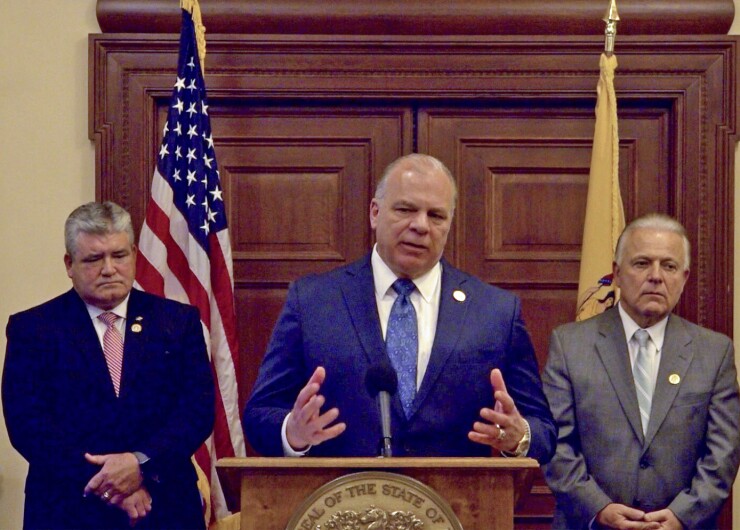The stage is set for a possible New Jersey government shutdown after Democratic lawmakers scrapped Gov. Phil Murphy’s millionaire’s tax proposal and pitched their own budget plan just two weeks before a July 1 deadline.
Legislative leaders announced Monday their own $38.7 billion 2020 fiscal year spending plan that doesn’t include the proposal from the governor, a fellow Democrat, to raise the tax rate on income above $1 million to 10.75% from 8.97%. Murphy had projected that the tax would raise around $500 million in revenue for his

“The state needs to be fixed before you have any conversation about raising taxes and the governor’s refusal to address some of the biggest problems that exist here is just not acceptable,” Senate President Steve Sweeney, D-Gloucester, told reporters Monday after the budget plan was approved by both Assembly and Senate committees. “All in all, our budget’s not that far off from the budget that he presented.”
The alternative budget floated Monday also takes out Murphy’s previous proposal to hike taxes and fees on gun sales. Lawmakers are instead proposing dipping into a rainy day fund that the Murphy administration has sought
Lawmakers are also looking to add $50 million of new funding for New Jersey Transit and property tax relief programs for the state's senior citizens and veterans. More than $300 million of savings from the governor's original spending plan were removed to account for the proposed new initiatives.
Murphy responded in a statement to the legislative budget proposal late Monday saying that the plan fails in addressing “tax fairness” and lacks “stable and sustainable revenues” for necessary state investments. He also noted concerns about eliminating the state’s first rainy day fund deposit since 2008 because of the need for New Jersey to brace for an economic downturn.
“I will continue to work with Senate President Sweeney, Speaker [Craig] Coughlin, the respective budget chairs, and leadership teams so we can, together, enact a stronger and more fiscally sound budget,” Murphy said. “Every option is on the table.”
Regina Egea, president of the conservative-leaning Garden State Initiative, said she does not expect a government shutdown to ultimately occur because of the political price Murphy would pay given that voters historically only pin blame on governors and not the legislature. She said a potential line item veto authority Murphy may exercise still could set the stage on a dangerous course though.
“The front office has shown little to no finesse on political matters so they could inadvertently add gasoline onto the fire already raging between the legislature and front office depending upon where they cut,” said Egea, a former chief of staff under previous Gov. Chris Christie. “It will provide good theatrics but won’t change the numbers.”
This marks the second straight year that New Jersey’s top lawmakers introduced their own fiscal plan near the budget deadline. Last June lawmakers rejected Murphy’s bid for a millionaire’s tax and to increase sales taxes back to the state’s previous 7% level. Murphy ended up signing a
Marc Pfeiffer, assistant director of Rutgers University’s Bloustein Local Government Research Center, said Murphy and the legislature will likely come to an agreement by the July 1 deadline since it would be in neither side’s interest to have a shutdown. He noted that New Jersey’s string of budget disputes dating back to past governors underscores the state’s lack of multi-year planning for factoring in increasing expenses needed for labor, pensions, health benefits, NJ Transit and pre-kindergarten.
“It’s time for the parties to sit down with advisors who understand the practicalities and politics of the environment and make sound decisions that get us to a sound balance,” Pfeiffer said.
The legislative budget proposal contains no changes to Murphy’s planned $3.8 billion contribution into the state's underfunded pension system, a $554 million budgeted increase that would bring the state to a 70% actuarially determined contribution level and keep the state on its schedule for full ADC funding in 2023. Low pension funding levels have dragged New Jersey’s general obligation bonds to the second lowest ratings of all U.S. states at A-minus by S&P Global Ratings, A3 by Moody’s Investors Service and A by Fitch Ratings and Kroll Bond Rating Agency, all with stable outlooks.





